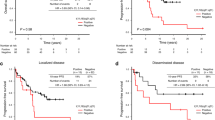Approximately 10% of gastric low-grade B-cell lymphomas of mucosa-associated lymphoid tissue (MALT) type are unresponsive to Helicobacter pylori (H. pylori) eradication treatment, and many of them contain an API2-MALT1 chimeric transcript mediated by t(11;18)(q21;q21) translocation. We here review the current status on the interrelationship among clinical features, H. pylori infection status, responsiveness to antibacterial treatment, and API2-MALT1 chimeric transcript of gastric MALT lymphoma in a unicenter study experience and discuss the clinicopathologic significance of API2-MALT1 chimeric transcript in gastric MALT lymphoma. We enrolled 59 patients with gastric MALT lymphoma in a unicenter study. H. pylori infection status and clinical stages were investigated. Antibacterial treatment and subsequent follow-up endoscopy were performed for the assessment of responsiveness of MALT lymphoma in every patient. All cases were examined for API2-MALT1 chimeric transcript by means of RT-PCR and sequencing analyses using RNA extracted from tissues. H. pylori infection status was assessed as positive in 50 patients and negative in 9. Antibacterial treatment achieved complete or partial remission in 41 patients and no change in 12. API2-MALT1 chimeric transcript was detected in 9 patients, all of whom showed no change in response to treatment. Notably, responsiveness to H. pylori eradication treatment most clearly delineated the enrolled cases into two groups, indicating that six factors (H. pylori infection, API2-MALT1 chimeric transcript, cobblestone mucosa and submucosal tumor in gross appearance, nodal involvement, and clinical stage) were statistically significant. On the other hand, comparison of two groups from the standpoint of H. pylori or API2-MALT1 chimeric transcript status revealed a lesser number of the statistically significant factors (two and three, respectively). Gastric MALT lymphoma characterized by unresponsiveness to antibacterial treatment contains all API2-MALT1 chimeric transcript-positive cases and may constitute a distinct group often seen with nodal involvement and an advanced clinical stage. This group is thought to be unrelated to H. pylori infection in its pathogenesis, and might share a unifying feature of genetic alteration such as involving the MALT1 locus on chromosome 18. Investigation in the future will clarify this issue and establish the clinical implication of such genetic alteration as the predictive factor for gastric MALT lymphoma.
Similar content being viewed by others
Author information
Authors and Affiliations
Rights and permissions
About this article
Cite this article
Nakamura, T., Inagaki, H., Seto, M. et al. Gastric low-grade B-cell MALT lymphoma: treatment, response, and genetic alteration. J Gastroenterol 38, 921–929 (2003). https://doi.org/10.1007/s00535-003-1234-4
Received:
Accepted:
Issue Date:
DOI: https://doi.org/10.1007/s00535-003-1234-4




